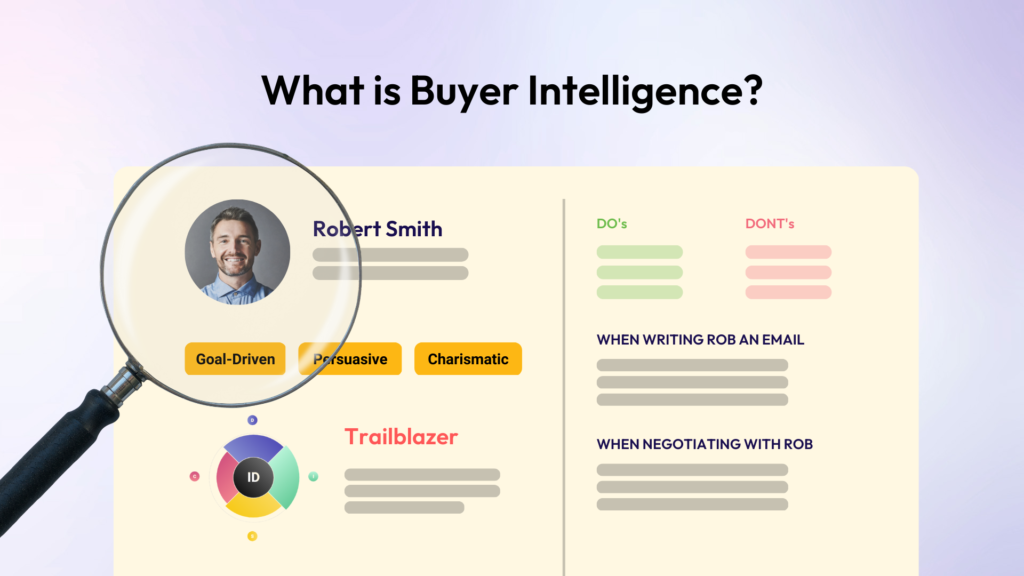Since the time selling has been around, sellers have wanted to know their buyers better. What engages them, what motivates them, and perhaps even importantly – what stops them from buying? Let’s dive in and find out how buyer intelligence can answer these questions, and then some.
The advent of the internet made it easy for sellers to go beyond ‘rolodexes’ or the word of mouth information. Social networks then made it possible for sellers to find at least some information about their buyers.
Today, most sellers rely on Linkedin to learn about their buyers. A few (less than 1 in 50) do manual (generally tedious, and often superficial) research to know their buyers better, so that they can adopt a “personalized” approach.
However, while finding contact information, job history, or past schools have all become easy, it does criminally little to help sellers truly know their buyers. It does nothing to help a seller learn what drives a buyer, what it takes to build trust, or to foster a strong relationship.
In fact, the biggest complaint buyers have about this type of personalization is that it feels insincere. And contrived — it’s obvious to the prospects when a “sales pitch” is about to follow.
However, in the absence of anything better, most sellers continue to rely on these half-measures. They substitute insight with intuition, and try to compensate by opening up machine gun fire (of outbound activities) enabled by their automation tools. Sellers have become their own worst enemies – responsible for creating the massive amount of noise they so desperately seek to differentiate themselves from!
This is where Buyer Intelligence comes in. Buyer Intelligence helps sellers think beyond automation. It helps them go beyond mountains of data that does little to move the needle. It allows sellers to combine science and technology to drill deep into these mountains of data to cull out unique, scientific, and elusive data-driven insights that were otherwise limited only to insiders.
Buyer Intelligence can therefore be described as:
Buyer Intelligence is the ability to truly know your buyers – the prospects as well as existing customers. It is separate from Account Intelligence in the sense that it focuses on ‘the people’ and not ‘the organization’.
Personality AI is at the core of Buyer Intelligence, as personality is the colored lens through which different people see and evaluate the world very differently. However, Buyer Intelligence also includes demographics (age, location etc.) as well as prographics (designation, education level, seniority level, experience etc.). All of these attributes together could be said to provide a ‘static’ picture of a buyer that underlies and defines most of the buyer’s decisions and actions.
Buyer Intelligence also includes a ‘dynamic’ picture of the buyer that defines how a buyer might behave under a given set of circumstances. The engagement or interest of a buyer in a certain product (or the sentiment during a certain meeting) can provide impactful insights to a seller about the direction in which a deal is heading; and the action that should be taken to keep it on track. Similarly, social influence of a buyer within the buying committee or the intra-committee dynamics could provide a seller meaningful insights into the possible outcome of a deal and the necessary action that must be taken to secure it.
Together, all these insights constitute Buyer Intelligence.
Where exactly does Buyer Intelligence fit in the Sales Intelligence stack?
Buyer Intelligence should be seen as the 4th pillar of ‘Sales Intelligence’. Most of the organizations today work with 2 or 3 of the following pillars:
- Account Intelligence (via tools like ZoomInfo) that provides them contact information, technographics, intent etc.
- Conversational Intelligence (via tools like Gong) that provides them insights into reps’ style and performance
- Deal Intelligence (via tools like Clari) that provides them insights into the status of the pipeline and the progress of the deals
However, when it comes to knowing the people, which is arguably the most critical piece of the sales puzzle (‘people buy from people’ and ‘people buy from people that they trust’), most sales teams are still working with next to nothing.
Now add in the fact that AI-generated content is soon going to be everywhere in sales. GPT has democratized content generation and very soon, ‘good copy’ will be a commodity. This is where the ‘human’ element becomes more than a nice-to-have, it becomes a must-have.
And that is exactly why Buyer Intelligence is becoming ‘an idea whose time has come’ – it’s the only technology that is about putting people first, establishing trust and selling authentically. No other technology puts the focus on the buyer like Buyer Intelligence does.
Sales is one of the toughest jobs out there. In many ways, it is like weathering the harshest of storms day in and day out. Working without buyer intelligence is like living in this weather in a house that has walls on three sides. And nothing but an empty void on the fourth.



